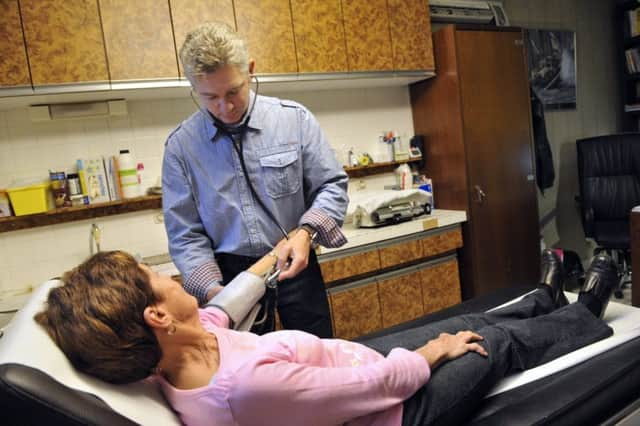Brian Monteith: NHS reform key to improving standards


It cannot be said often enough that if the string of bad news about our SNP government’s disastrous management of education, healthcare, policing and the rest were to happen at a UK level David Cameron would be on the rack and could not have won the general election. While there can be no doubt that the SNP’s strategy of placing constitutional issues ahead of discussing much-needed public service reform is chiefly responsible for our collective delusion, the unwillingness of all political parties to embrace market reforms means there is no alternative to the received wisdom that spending ever-more taxpayers’ money is the solution.
Without alternatives there can be no debate and so we are locked into a one-dimensional discussion about spending decisions made in Westminster that forgets there have been times of plenty as well as times of austerity.
Advertisement
Hide AdAdvertisement
Hide AdSurely the task of our political class must be to determine through public discourse how best to manage public service responsibilities on the budgets they have rather than to distract us with pipe dreams of what would be possible if only we spent more of the, as yet, unearned income of future generations?


Two examples of our current healthcare failures were reported this week when a survey of general practitioners in Scotland found that a third believed their workload to be unmanageable while more than a half wanted the SNP’s Quality and Outcomes Framework to be scrapped. Given that GPs have experienced significant increases in remuneration over the last decade it is startling to find them so unhappy – and yet the evidence shows that attracting people into GP practice is becoming harder than ever. The reason is not money but the growth in professional administration, much of it dictated by regulation and protection from litigation, that has made the job more distant from the patient.
The second example was the exposure of a doubling in the use of private sector consultants from 13,000 to 28,000 procedures (costing over £37 million) – in direct contradiction of Nicola Sturgeon’s claim that the SNP government would prevent the NHS’s so-called drift towards privatisation.
Such a claim was both misleading and dangerous; misleading because GPs are and always have been private contractors to the NHS ensuring there is not so much a drift as an ebb and flow – and dangerous because the worldwide experience is that advances in healthcare outcomes are best achieved where there is choice through competition of supply.
A new paper released by the Institute of Affairs, A Patient Approach: putting the patient at the heart of UK healthcare, by Dr Kristian Neimietz poses the question of how to improve healthcare by learning what is done better in other countries. This in itself is a revolutionary concept for we too often delude ourselves into believing our NHS is the best in the world – when it most patently is not. We also allow ourselves to be convinced into believing that the only alternative is the United States healthcare model of an insurance-funded private sector, when there are many examples of high-performance mixed-economy models that repeatedly out-perform the UK system.
The combination of these two parameters, what we might call healthcare chauvinism and there being no alternative to spending more money other than to go private, has created a dangerous prejudice against allowing greater use of the private sector to help guarantee the principle of open access to everyone irrespective of means. As Niemietz demonstrates, countries with pluralistic healthcare systems where patients have a clear choice between public, private non-profit and private for-profit providers – record repeatedly many of the best health outcomes in the world.
Countries as disparate in size and social profile as Australia, France, Germany, Japan, Luxembourg, Netherlands, South Korea and Switzerland have large, competitive private healthcare sectors and yet in international rankings are almost always among the top performers. A paper published last year by ThinkScotland also demonstrated how the Scottish NHS is slipping behind the English NHS in clinical outcomes, thanks in part to a more open-minded approach to using private sector professionals.
Having a sizeable private sector in health care offers competitive alternatives that provide innovation in clinical practice and management that a monolithic centralised system cannot hope to rival. UK politicians, be they in London or Edinburgh like to talk about flexibility and local decision-making but must know that the centralised target-driven approach that both they and the complicit professional bodies work by establishes a straightjacket that makes the reality entirely different from their rhetoric.
Advertisement
Hide AdAdvertisement
Hide AdA growing private sector also means the capacity of the healthcare sector can expand without detracting from public sector activity so there is greater total provision. The suggestion that private sector healthcare replaces the public sector need not be true, unless politicians themselves set it up primarily to do that.
In Europe the mixed public-private healthcare model often benefits from funding provided for employees by their employers and there is a great deal of scope for this to be encouraged by treating health provision as a business expense rather than penalising it as the Chancellor does at the moment. This would attract a new wave of investment that could result in new clinics being established helping capacity grow to meet demand.
Rather than being the privilege of the few, and thus seen as an exclusive luxury, access to private healthcare could become as normal as taking a foreign holiday and become a routine aspect of pay bargaining for trade unions as it can be less costly than a pay rise. It would also have the benefit of taking much of the politics out of the NHS, where to advocate any reform is often presented as a heresy against a national religion that must follow the scriptures laid down by Labour’s founding fathers that established it.
It was Aneurin Bevan’s drive to nationalise our hospitals – even the purely charitable ones – that took us down the wrong road and from which we must return. Not through privatisation of existing services but through expansion of the private sector to help raise clinical standards for all while retaining the NHS principle of free care being at the point of delivery.